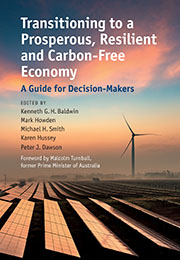
The book pulls together the key elements and issues about the transition to low carbon, climate-adapted economy in one volume.
‘Transitioning to a Prosperous, Resilient and Carbon-Free Economy: A Guide for Decision-Makers’ arrives at a decisive moment for the international efforts to tackle the climate crisis – in the wake of the pivotal International energy Agency (IEA) Net Zero by 2050 Roadmap for the Global Energy Sector (May 2021) and the G7 commitments to stronger action on climate change (June 2021). It comes in time for the UNFCCC Conference of the Parties (COP) in Glasgow. It nicely complements the work of the International Energy Agency (IEA) and the G7 by setting out, in an accessible form, the actions and resources needed to address the challenges of climate change. These include the technologies, policies and legal structures needed, supported by economic modelling. It also covers financing the transition and sectoral strategies including for cities, industry, transport, mining, agriculture and forestry. The book pulls together the key elements and issues about the transition to low carbon, climate-adapted economy in one volume. Its sixty-three co-authors are established experts in their fields and write independently. They share no particular viewpoint or ideology beyond an acceptance of the scientific evidence for climate change and its impacts.
The communique from the G7 summit in June 2021 put the challenge of climate change vividly. It said: ‘The unprecedented and interdependent crises of climate change and biodiversity loss pose an existential threat to people, prosperity, security, and nature.’ It committed G7 members to more ambitious climate goals and heightened efforts to reach them. The IEA Roadmap defines what is needed in the crucial energy sector to achieve the transformation of the world’s economies and societies. At the UNFCCC Conference of the Parties (COP) in Glasgow the world comes together to consider the way forward on climate change including how to limit temperature increases to well-below 2oC over pre-industrial levels and, if possible, to 1.5oC.
Profound changes are called for and, as this book points out, these changes are achievable though highly challenging.
Profound changes are called for and, as this book points out, these changes are achievable though highly challenging. The book outlines measures to combat dangerous climate change; and how, in doing so, these initiatives can deliver huge benefits for economies, communities and the natural environment. Major opportunities for profitable businesses and well-paid jobs beckon in this new environment as well as increases in GDP and the welfare of peoples. A just transition to the new economy can ensure that no-one is left out as economies shift away from some industries and activities to new technologies and lifestyles.
The book is intended to clarify the actions needed for the above transformations, and be a practical guide for decision makers responsible for formulating and implementing the most appropriate choices to create a low-emissions society. At the same time it aims to be accessible to the general reader and, as such, should play a useful role in the education sector.
The book makes reference to the likely consequences of inaction – rising temperatures, desertification, floods and sea level rise that can have devastating impacts on human society and economies – but takes an optimistic view of the future. This is based on the availability of most if not all the technologies needed to slow and reverse climate change. It finds ‘green shoots’ in many areas including low and declining costs of renewable energy and increasing support from the financial sector to achieve de-carbonisation.
The book has five editors. Ken Baldwin has been Director of the ANU Energy Change Institute overseeing cross-university energy research; Mark Howden is the Director of the Institute for Climate Energy and Disaster Solutions at the ANU and is Vice Chair of the Inter-Governmental Panel on Climate Change (IPCC); Michael Smith, also affiliated with the ANU, has researched and published widely on climate change and advises on government policy; Karen Hussey researched policy, institutional and governance arrangements as professorial head of the Queensland University’s Centre for Policy Futures, and now leads environmental policy work in the Queensland Government. Peter Dawson’s role has been coordination, as managing editor.

Latest Comments
Have your say!